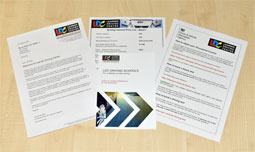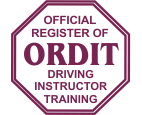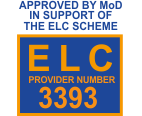Road markings
Across the carriageway

Stop line at signals or police control

Stop line at 'Stop' sign

Stop line for pedestrians at a level crossing

Give way to traffic on major road (can also be used at mini roundabouts)

Give way to traffic from the right at a roundabout

Give way to traffic from the right at a mini-roundabout
Along the carriageway
 Centre line (see Rule 127)
Centre line (see Rule 127) Hazard warning line (see Rule 127)
Hazard warning line (see Rule 127)

Double white lines (see Rules 128 and 129)
 Diagonal hatching (see Rule 130)
Diagonal hatching (see Rule 130) Lane line (see Rule 131)
Lane line (see Rule 131)Along the edge of the carriageway
Waiting restrictions
Waiting restrictions indicated by yellow lines apply to the carriageway, pavement and verge. You may stop to load or unload (unless there are also loading restrictions as described below) or while passengers board or alight. Double yellow lines mean no waiting at any time, unless there are signs that specifically indicate seasonal restrictions. The times at which the restrictions apply for other road markings are shown on nearby plates or on entry signs to controlled parking zones. If no days are shown on the signs, the restrictions are in force every day including Sundays and Bank Holidays. White bay markings and upright signs (see below) indicate where parking is allowed.

No waiting at any time

No waiting during times shown on sign
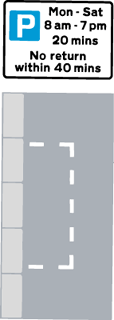
Waiting is limited to the times and duration specified during the days and times shown
Red Route stopping controls
Red lines are used on some roads instead of yellow lines. In London the double and single red lines used on Red Routes indicate that stopping to park, load/unload or to board and alight from a vehicle (except for a licensed taxi or if you hold a Blue Badge) is prohibited. The red lines apply to the carriageway, pavement and verge. The times that the red line prohibitions apply are shown on nearby signs, but the double red ALWAYS means no stopping at any time. On Red Routes you may stop to park, load/unload in specially marked boxes and adjacent signs specify the times and purposes and duration allowed. A box MARKED IN RED indicates that it may only be available for the purpose specified for part of the day (e.g. between busy peak periods). A box MARKED IN WHITE means that it is available throughout the day.
RED AND SINGLE YELLOW LINES CAN ONLY GIVE A GUIDE TO THE RESTRICTIONS AND CONTROLS IN FORCE AND SIGNS, NEARBY OR AT A ZONE ENTRY, MUST BE CONSULTED.

No stopping at any time

No stopping during times shown on sign

Parking is limited at the times for duration specified during the days and times shown

Only loading may take place at the times shown for up to a maximum duration of 20 minutes
On the kerb or at the edge of the carriageway
Loading restrictions - on roads other than Red Routes
Yellow marks on the kerb or at the edge of the carriageway indicate that loading or unloading is prohibited at the times shown on the nearby black or white plates. you may stop while passengers board or alight. If no days are indicated on the signs restrictions are in force everyday including Sundays and Bank Holidays.
ALWAYS CHACK THE TIMES SHOWN ON THE PLATES.
Lengths of the road reserved for vehicles loading and unloading are indicated by a white 'bay' marking with the words 'Loading only' and a sign with white on blue 'trolley' symbol. This sign also shows whether loading and unloading is restricted to goods vehicles and times at which the bay can be used. If no times or days are shown it may be used at any time. Vehicles may not park here if they are not loading or unloading.
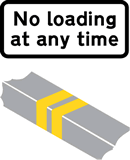
No loading or unloading at any time
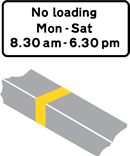
No loading or unloading at the times shown

Loading bay
Other road markings
Keep entrance clear of stationary vehicles, even if picking up or setting down children

Warning of 'Give Way' just ahead

Parking space reserved for vehicles named
 Bus stop (see Rule 243)
Bus stop (see Rule 243)
Bus lane (see Rule 141)
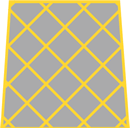
Box junction (see Rule 174)

Do not block that part of the carriageway indicated
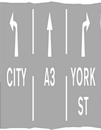
Indication of traffic lanes
Vehicle markings
Large goods vehicle rear markings
Motor vehicles over 7500 kilograms maximum gross weight and trailers over 3500 kilograms maximum gross weight

The vertical markings are also required to be fitted to builders' skips placed in the road, commercial vehicles or combinations longer than 13 metres (optional on combination between 11 and 13 metres)
Hazard warning plates
Certain tank vehicles carrying dangerous goods must display hazard information panels
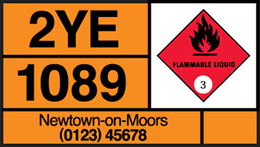 The panel illustrated is for flammable liquid.
The panel illustrated is for flammable liquid.Diamond symbols indicating other risks include:

The above panel will be displayed by vehicles carrying certain dangerous goods in packages
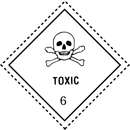
Toxic substance
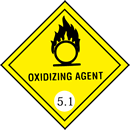
Oxidising substance
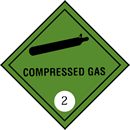
Non-flammable compressed gas
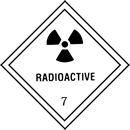
Radioactive substance
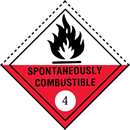
Spontaneously combustible
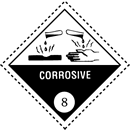
Corrosive substance
Projection markers


Other
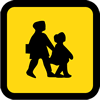 School bus (displayed in front or rear window of bus or coach)
School bus (displayed in front or rear window of bus or coach)

